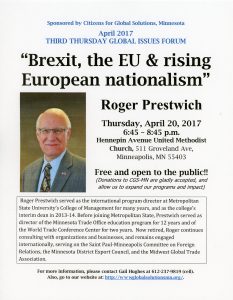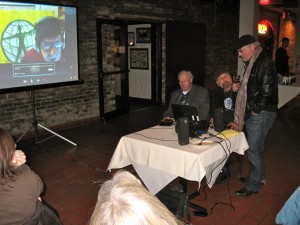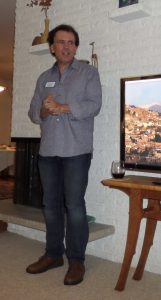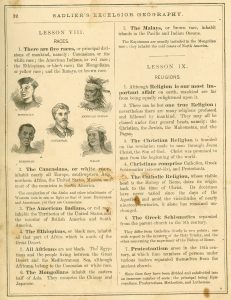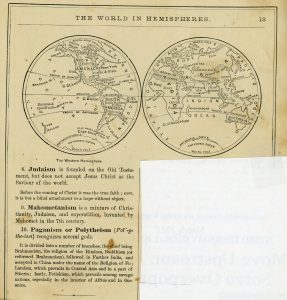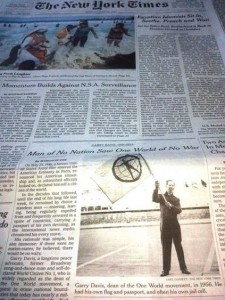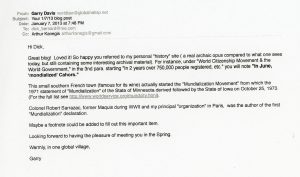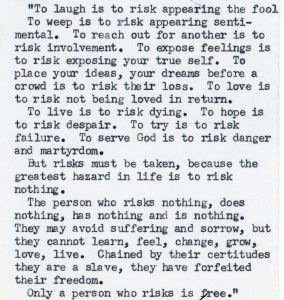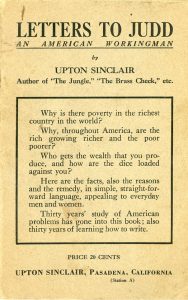Donald Trump becomes U.S. President on January 20. I’ll recognize that he is President, but in the 14 inaugurations since I turned 21 (then, the voting age), this one will pass me by minimally noticed. I’ve come to know Trump far too well for over a year: from his own mouth and Twitter; I’ve learned about his “base”, from his choice of issues and slogans at his rallies, and from trash e-mails from his most ardent supporters. I have learned about his future direction, from noting who he has selected for his inner circle. I don’t think he can change.
One shouldn’t set aside the shameful way the Republicans (and Trump) dealt with Hillary Clinton for years and years. They were terrified of her. I hope she doesn’t back away. And the same Republicans did everything in their power to damage the legacy of President Obama. In that, they also failed, regardless of what they do to try to slash and burn his accomplishments, like the Affordable Care Act (“Obamacare”).
Following is my opinion, and I emphasize, it is only my opinion. But I don’t think I’m alone.

Germany, 1954
Wednesday, I happened by the television which, at the moment I came by, was the hearing for
Rex Tillerson as Trumps Secretary of State designee.
Tillerson has an appropriate high level executive look and bearing, of course. “When he talks, you listen”. He had just received a “softball” question from a Senator along the lines of “how many countries have you visited?” Tillerson wasn’t sure – perhaps about 40, he said. Then he was asked about how people he had met in these countries perceived American foreign policy. He was diplomatic, of course, but the suggestion was that the people he talked to wanted change.
It was an innocuous vignette, but it drew me in. There are about 193 countries in the world, and there are over 7 billion people. Tillerson certainly had talked to some people who had opinions, as have we all, but who were these people, and what would that prove? He has a particular area of expertise. There is not a single decision ever made by any person in high level decision making in government that has not been wrong in some observers mind. It is a reality of the public leadership.
More interesting to me is that Tillerson’s entire working career has been with what is now ExxonMobil, and I recall he was recommended for the job by, among a few others, Richard Cheney, former U.S. vice-president and before that U.S. Government official and Halliburton chief executive.
One might recall that Halliburton did very well during the good old days of the Iraq War. Cheney was a central and crucial part of the team promoting and prosecuting that disastrous war which still involves us.
Behind the easy questions and the unchallenged answers lies much more to the story of not only Tillerson, but every other Trump appointment to his Cabinet. It is a club of, by and for the already rich. The “swamp” is just being refilled.
I went about my other work of the day.
*
About the same time as the Tillerson hearing, the network cut in to the Trump news conference at Trump Tower in New York City. I wasn’t watching that, but later reports spoke for themselves. The media, and the people who watch them, face a real dilemma in these coming long, long weeks and years: Trump is money in the bank for them. He’s a draw, and that is what networks want: viewers, aka generators of advertising revenue.
On the other hand, as evidenced by that first press conference, he is trashing selectively media who are critical of him, broadcasting the label “fake news” – which is red meat for his base. At the same time, he has benefited by “fake news”. It has become hard to discern what to believe….
By now, everybody who pays any attention at all to Trumps routine has to know that the prudent person cannot believe a single word he says, regardless of how fervent he is in declaring its truthfulness; nor how often or loudly he repeats it. Parts of what he says might be true, most likely not. He gives meaning to the phrase “caveat emptor”, “let the buyer beware”. And he is not yet even in office of President.
Serial lying and out and out bullying has served Trump well. And coupled with being a charismatic pitchman, comfortable with the media and a media celebrity elite, about to become the most powerful person in the world, and caring only about himself and his ego, this makes for a potentially lethal combination…for us all.
People best beware of being sucked in. This is not a time to be disconnected.
It will be interesting to see how the media in general deal with the contradictory objectives: making money, and responsible reporting.
*
Speaking only for myself, my specific on going concern is this:
In my fairly long life, I have never seen such a scurrilous, dishonest, down and dirty campaign against a person, as I saw waged against Hillary Clinton. This was waged for years against Hillary Clinton, personally, and in fact continues.
Similarly, a war was declared on President Barack Obama as he became President of the United States, with Republican efforts to block his success. In spite of all of this, the Obama administration was successful. You would never hear such a word from the Republicans.
I see no need to be respectful of those who engage in reprehensible behavior. You expect campaigns to be hard-fought, but not the scorched earth we have experienced for the past many years.
Personally:
1) I have no interest in validating Trumps daily declarations by being part of his audience. Personally, I am sick and tired of the daily dose of Trump, and my limited television viewing, almost all of ‘news’, is decreasing, and I am letting my news anchors of choice know this. I almost never have been surveyed; I have to write a real letter as a real person to another real person. It needs to be done. I have done this in the past. These letters are read.
2) The crucial actors in this continuing circus will be the members of Congress, both Senate and House. It is not enough to be silent. If there are any ways to give witness, such as the pending
million women march in your area, go for it, and let your congressperson and senator, and, for that matter, your state legislators and Governor as well. The “nice person” who is your own local congressperson or whatever has a record which deserves scrutiny between now and the next election. He/She most cares about reelection.

Germany 1998
No one knows, of course, what Trump will actually do, which is especially worrisome to those who are “in the know” at the highest levels. No one knows, even the Republican leadership who embraced him, what he might do, or when, or even how. Perhaps he doesn’t know….
I think that recalling Nazi Germany is useful, just as a caution.
First, Americans in general are moderate, nice people. We know that. My most recent issue of the American Spectator (January, 2017) is highly worth the time to read in its entirety:
Spectator001.
So were most of the Germans in the awful time after WWI, even in time of desperate poverty. People are people, universally.
My mother was 100% German, both grandfathers migrated from Germany to the U.S. in the 1860s, and I have German cousins who I have visited. A dear friend of mine was 7 years old when Hitler and the Nazis consolidated their power in 1933. She was 18 when the Germans surrendered in 1945, their country in ruins, millions dead and displaced, the dreams of a 1000 year Reich gone after a dozen years.
Beginning in the 1920s, it was Hitler’s aim to “Make [Germany] Great Again”, with all that entailed. In 1933, the Nazis took control of the government. The dream lasted perhaps ten years….
Years ago I got serious about my roots, both German and French. In the process of gathering data from anyone and everyone, a relative in Illinois sent some photos taken by another relative in Iowa who visited the home farm in Germany in 1954.
One of the photos is at the beginning of this blog.
This was nine years after the war, and judging by the other photos, it was obvious from the photos reconstruction had not been completed. This was not the prosperous Germany we see today. The visitor was taken around by horse drawn wagon. (The farm I saw in 1998 was very prosperous.)
The photo is of a shrine in the yard of the ancestral farm house. I asked about it when I visited the cousins in 1998, and I took the followup photo during my visit there (the one immediately above). The statue remains identical to this day, I believe.
I was told that four men of the farm had been drafted into the German Army in WWII, and the statue to the Blessed Virgin was raised as a prayer of sorts for their safety in the conflict.
They all came home, apparently intact and uninjured, but none of them had ever, according to my relative, said anything about their experience. It was a forbidden topic. They had all died, their stories buried with them.
My German friend, Anneliese, had a similar story with a different ending. Her father and mother refused to join the Nazi Party (which benefited those who became members), and he was drafted into the Army, and was last seen about Christmas in 1944. He worked on a road crew as an engineer, I believe, and they think he was killed in Russia, but are not sure, and the search continues for closure.
In effect, he received a death sentence for his resistance to the Nazis.
Can Nazi Germany happen here? These are different times, and as I’ve noted, we are a different society. In answer to my own question, I don’t think so…but never in my wildest imagination could I envision a crude egotistical dishonest billionaire becoming our President, either.
1933 Germans, while just coming out of deep poverty after WWI, were susceptible to the same
messages as 2016 Americans were: anger, resentment, identifiable enemy (in one case the Jews, in another Muslims, illegals….) And the resentment was fanned by a charismatic leader with a great pitch who promised he and they would “Make America [Germany] Great Again”.
There are similarities and differences between 1933 Germany and 2017 America, but the reality is that there is a far closer relationship than we care to revisit.
To start, it took lots of good Germans in the 1930s to get and keep the Nazis in power. In the beginning the Nazis were a nuisance; later, people self-silenced.
In the end, as
Martin Niemoeller often said so famously, in sometimes different specific ways:
“First they came for the Socialists, and I did not speak out—
Because I was not a Socialist.
Then they came for the Trade Unionists, and I did not speak out—
Because I was not a Trade Unionist.
Then they came for the Jews, and I did not speak out—
Because I was not a Jew.
Then they came for me—and there was no one left to speak for me.”
The Thousand Year Reich was destroyed. We have the potential of doing the same to ourselves.
The temptation is to pretend that we aren’t vulnerable; or to say in many ways, “there’s nothing I can do anyway”, and then prove the point by doing nothing.
This is our country, and our future, and now is not the time to pretend that all will work out, that Donald Trump will change his stripes, and “Make America Great Again” (as if it isn’t already a great country.)
COMMENTS:
from Leila: I keep waiting for someone to stop this trainwreck.
from Bill: I am committed to a total boycott of all TV on 1/20/17. I will find something else productive to do instead.
from Jan: well stated and we cannot be silent in the days ahead!
from Joni: I shared to my wall with comments. Thank you for once again articulating so clearly and eloquently what my heart and head feel.
from Suzanne: Thank you for the post…..I will be in DC for the women’s march.
from Nancy: So, my question is why are we as a nation being forced to take Drumpf’s punishment? He has shown himself to be unfit for the office and the responsibilities. He shouldn’t be inaugurated.
from Annelee, Jan 15: (Anneliese is referenced above, and is the lady who grew up in Nazi Germany. Her comments are shared with her permission.)
Your blog today gives me and those who read you what was there all the time, but I and some us didn’t see it till now.
I have been thinking about TRUMP—and the more I think, the more he scares me. WHY?
GERMANY 1933 is coming to America—will the people notice?
Why was I so blind????
…Don’t shut [Trump] out, listen to all he says, does— [my] Papa and Uncle Pepp knew [about what was happening in our town in Germany] but most of the time they kept quiet—
…When you say the media?? He uses it so skillfully already: he said, “The media spreads false news, just like it was happening in NAZI Germany.”
People to this day fear Nazi Germany— His supporters surely gobble that up and remember the bad media.
It wasn’t the media that gave the story about Russia knowing negative things about [Trump]; it came from Britain.
Did he correct that he was wrong? Never!
I wish someone could have looked into the papers he had displayed [in envelopes at his news conference which] showed he is giving his business to his sons— I bet they were empty [envelopes].
The similarities of the 1933 promises Hitler made, look the same as what Trump is proposing.
Give the population some good times and then, when you have them convinced that you are the best— you can do what you want.
What frightens me the most is how he already blames and attacks the press. If our press is not free, the non-thinking population is sucked in and set for doom.
NOTE from Dick: I have known Annelee for 14 years, and she has spoke and written extensively about how it was to a young person in a small German town during the time of Hitler. When the Third Reich took root, it was dangerous to talk to the wrong people. Annelee (her name was changed when she came to America in 1947) is completing a third book on her 90 years of life experience in Germany and the U.S. In fact, I met her when I read a review of her first book in 2003. Her website is
here.
